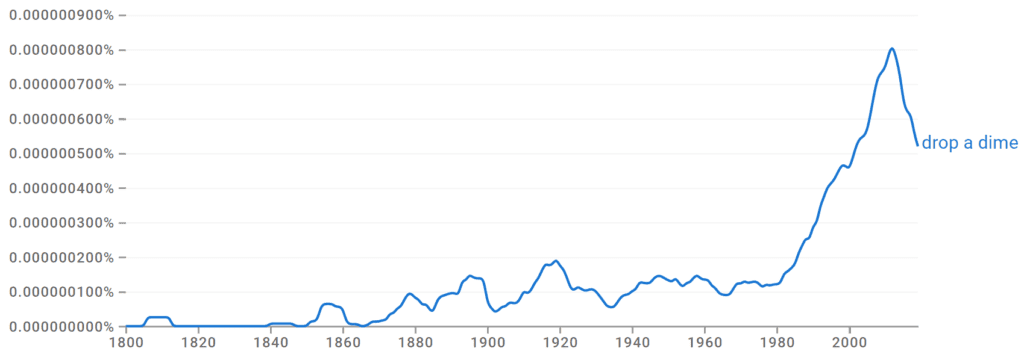If someone said they had to go drop a dime on someone, what’s the image that would come to mind? Probably the same as anyone else; a person literally dropping a ten-cent piece on someone’s head. But the phrase actually has a completely different meaning than you think. I’ll explain where it started and how to use it properly.
What Does Drop a Dime Slang Mean?

The oddball phrase “drop a dime” is actually an idiomatic expression that’s been used in American English for decades. It is basically a colloquial way of saying “to make a phone call,” and it is often used to indicate that the call being made is secret or discreet in nature.
I’ve actually never heard the expression before, so I had to do some digging and learn myself. But now I’m thinking I may use it when writing fiction to add some color to my character’s dialogue.
I did learn that it’s also a term they use in football. When a player gets a 10 out of 10 throws, they all call it dropping a dime or throwing dimes.
Where Did the Phrase Come From?

From what I can tell, the origin goes all the way back to the days before cell phones. You see, way back in the early 1900s, US old folk used payphones instead of cellphones. Payphones required a ten-cent coin to be inserted into the coin slot in order to make a call.
This led to the phrase “drop a dime,” as someone would literally drop a dime into the payphone to make a call. If you were born after the 2000s, you’ve probably seen it in movies.
Modern Usage of Drop a Dime
Over time, the phrase has evolved to take on a more figurative meaning. You’ll often see it used to indicate that someone is making a call to “rat out” or inform someone else, usually to the authorities.
In this context, “drop a dime” is often used as a verb. A member of the mob in a crime movie might say, “I’m not going to drop a dime on you, but you should be careful.”
However, the phrase isn’t just limited to this negative sense. You could say it when making a call to share important information or to tell someone something important, like calling your boss to tell him you’ll be late.
The phrase “drop a dime” is also frequently used in popular culture, particularly in movies, TV shows, and books set in the 20th century. It is often used to set a particular time and place and to give a sense of nostalgia or a historical context.
In recent years, the phrase has fallen out of use as payphones have become increasingly rare. My kids thought I was making it up when I tried explaining the concept to them!
However, it’s still generally understood and used by lots of people, mostly older generations who remember the good ol’ days of payphones.
Sentence Examples Showing How to Use Drop a Dime
Say it with me: Context is everything. Part of learning how to use a word or phrase is all in delivery, so seeing sentence examples always helps.
- I’m not going to drop a dime on you, but you should be careful.
- I had to drop a dime to my boss and give him a heads-up that I’ll be late.
- I heard he’s been hanging out with some shady characters; I might have to drop a dime to the police.
- I couldn’t reach him all day, so I decided to drop a dime and call his cell phone.
- I know you’re up to something, but I’m not going to drop a dime on you; just be careful.
With the death penalty off the table, neither the suspected black widow nor her beau has any incentive to drop a dime on the mystery man. (The Toronto Sun)
Drop Us a Dime if You Have Questions!
Overall, the phrase “drop a dime” is an interesting example of how language changes over time. While the phrase isn’t as common as it once was, I think it’s still a cool piece of American English that has stood the test of time.
Related Articles:
